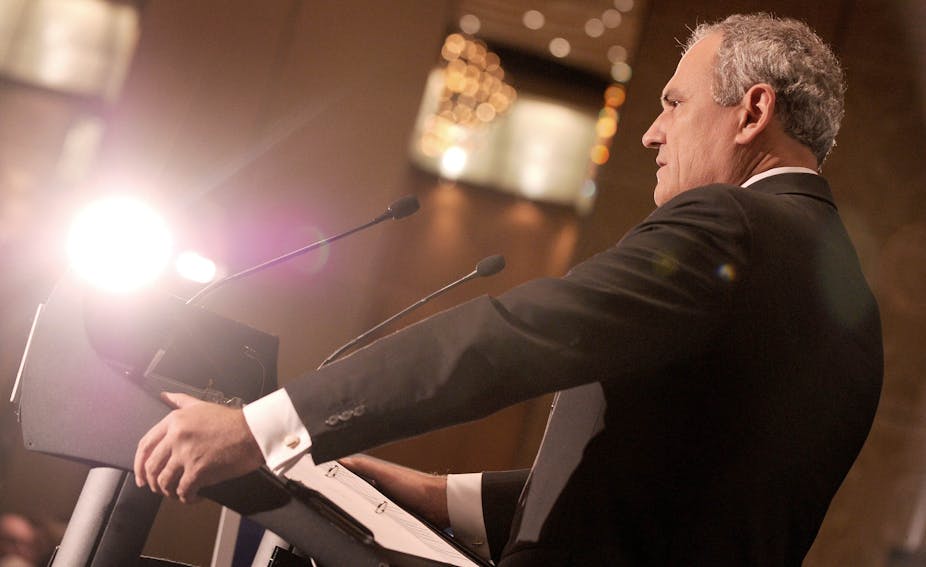The concept of death duties reared its controversial head publicly recently, with Greens Senator Lee Rhiannon quizzed on party policy by the ABC’s political editor Chris Uhlmann.
Greens leader Bob Brown has previously said it was not a priority. Certainly the tax has been considered politically unpalatable.
But such a tax is not without its supporters - including former Treasury Secretary, Ken Henry - and with a promised Tax Summit months away, it’s probably not a bad time to revisit some of the issues.
Inheriting inequality
Firstly, this year’s BRW Rich 200 list reminds us of the importance of inheritance in perpetuating economic inequalities.
Topping the list as Australia’s wealthiest person is Gina Rinehart, daughter of wealth mining magnate Lang Hancock.
In fourth place is Anthony Pratt, son of businessman Richard Pratt. James Packer and Lachlan Murdoch are also familiar names among the top wealth holders – just like their dads.
So is this just a matter of “choosing your parents wisely”? Or is the transmission of massive inherited wealth an obstacle to achieving the liberal ideal of equality of opportunity?
Should there be a tax specifically designed to tap into the transmission of wealth inequities?
‘Un-Australian’ and the ‘fair go’
Some would say any inheritance tax would be “un-Australian”. To be sure, any new tax is unwelcome to those who would have to pay it.
But don’t “Australian values” include social mobility and the “fair go”? And shouldn’t the tax burden reflect ability to pay?
Of course, some people make it to the BRW rich list without inherited wealth, but their descendents will also be able to afford to pay an inheritance tax, won’t they?
And such a tax won’t deter people from getting rich, will it?
Supporters
Support for an inheritance tax comes from many serious analysts of public finance. Henry’s tax review gives support for the principle of an inheritance tax, although this is buried in just a few lines in the huge report.
Henry rather quaintly calls it a bequest tax – a tax that would be levied on the accumulated wealth of people at the time of their death.
His review gives it a thumbs-up, saying it would be economically efficient, but then drops it because of its “controversial history”.
Indeed, inheritance taxes used to exist in Australia until the late 1970s. They were levied by both state and Commonwealth governments.
In 1978, Joh Bjelke-Petersen, the idiosyncratic Premier of Queensland, decided to abolish inheritance tax. Not surprisingly, the governments of other states followed.
Prime Minister Malcolm Fraser then quickly eliminated the federal inheritance tax, probably thinking that this would boost his flagging electoral popularity.
That decision was crucial because it is only at the national government level that an estate tax could sensibly be created now.
The international experience
National inheritance taxes exist in many other countries, such as the United Kingdom, Germany, Italy, Belgium, the Republic of Ireland, France, the Czech Republic, Canada and some states in the USA.
In the UK, for example, inheritance tax is imposed on assets with value in excess of £325,000, at a rate of 40% of the value of the estate above that threshold.
Inherited wealth is unearned income. It differs in this respect from wealth generated through thrift, enterprise or sheer hard work. So the ethical basis for taxing inherited wealth is quite distinctive.
The social equity argument is also strong. Inheritance perpetuates economic inequalities inter-generationally and therefore obstructs egalitarian ambitions. Income thereby begets wealth and wealth begets income.
Taxing inherited wealth would create a less unequal distribution of income and produce a more ‘level playing field’ within the society.
‘Strong case’
Even orthodox economists concede that there is a strong case for inheritance taxation. This is because it does not have the adverse economic consequences that they commonly say results from some other forms of taxation.
Income received from inheritance is a windfall gain. It has no relationship to the economic efforts of the recipient/s. So inheritance tax is unlikely to adversely effect economic productivity.
Inheritance tax can also produce a good revenue stream for the government, taking the pressure off other forms of taxation and/or financing socially desirable government expenditures (such as public housing provision, the education of young people, child care services or hospitals).
The amount of revenue that would be generated by a new tax on inherited wealth in Australia would depend on its precise form, of course.
The question of the appropriate threshold is particularly important is this regard. There is a trade-off between politics and economics here - between the political acceptability to a broad ‘middle class’ within the electorate and the economic goal of raising substantial tax revenue.
A threshold set at $5 million, as the Australian Greens currently propose, is at the politically cautious end of this trade-off.
If the threshold were set at $2 million, the inheritance tax would still apply to only about 5% of households but, set at a rate comparable to that in the UK, for example, it could generate sufficient revenue to finance free tertiary education, for example, or a very substantial boost to public housing to address the ongoing crisis of housing affordability.
The politics of an estate tax
New taxes, although never popular, can be made more palatable if they address major social problems and injustices. Political acceptability is also enhanced if there is a link between the tax revenue and specified socially desirable expenditure.
Unequal societies tend to be unhappier societies. They generally have a higher incidence of mental and physical illness, violence, crime and incarceration.
Taxing wealth inheritance does not solve all these stresses, of course, but it helps to create a sounder economic foundation.
The first step is to get the issues talked about: hopefully, October’s Tax Summit will provide the opportunity to get the necessary conversations started.

